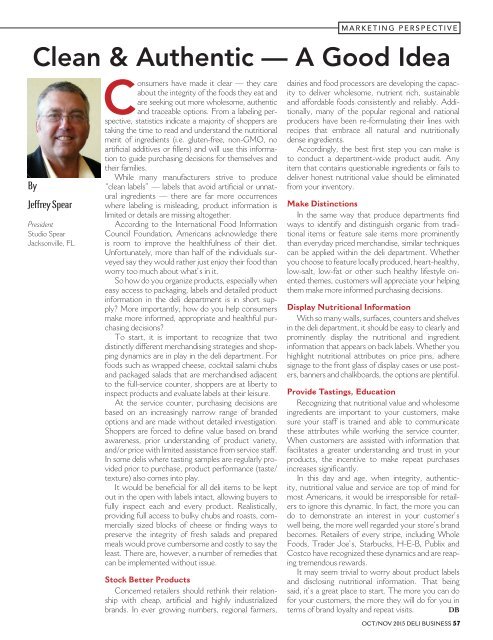DELI BUSINESS
1iADwm7
1iADwm7
Create successful ePaper yourself
Turn your PDF publications into a flip-book with our unique Google optimized e-Paper software.
By<br />
MARKETING PERSPECTIVE<br />
Clean & Authentic — A Good Idea<br />
Jeffrey Spear<br />
President<br />
Studio Spear<br />
Jacksonville, FL<br />
Consumers have made it clear — they care<br />
about the integrity of the foods they eat and<br />
are seeking out more wholesome, authentic<br />
and traceable options. From a labeling perspective,<br />
statistics indicate a majority of shoppers are<br />
taking the time to read and understand the nutritional<br />
merit of ingredients (i.e. gluten-free, non-GMO, no<br />
artificial additives or fillers) and will use this information<br />
to guide purchasing decisions for themselves and<br />
their families.<br />
While many manufacturers strive to produce<br />
“clean labels” — labels that avoid artificial or unnatural<br />
ingredients — there are far more occurrences<br />
where labeling is misleading, product information is<br />
limited or details are missing altogether.<br />
According to the International Food Information<br />
Council Foundation, Americans acknowledge there<br />
is room to improve the healthfulness of their diet.<br />
Unfortunately, more than half of the individuals surveyed<br />
say they would rather just enjoy their food than<br />
worry too much about what’s in it.<br />
So how do you organize products, especially when<br />
easy access to packaging, labels and detailed product<br />
information in the deli department is in short supply?<br />
More importantly, how do you help consumers<br />
make more informed, appropriate and healthful purchasing<br />
decisions?<br />
To start, it is important to recognize that two<br />
distinctly different merchandising strategies and shopping<br />
dynamics are in play in the deli department. For<br />
foods such as wrapped cheese, cocktail salami chubs<br />
and packaged salads that are merchandised adjacent<br />
to the full-service counter, shoppers are at liberty to<br />
inspect products and evaluate labels at their leisure.<br />
At the service counter, purchasing decisions are<br />
based on an increasingly narrow range of branded<br />
options and are made without detailed investigation.<br />
Shoppers are forced to define value based on brand<br />
awareness, prior understanding of product variety,<br />
and/or price with limited assistance from service staff.<br />
In some delis where tasting samples are regularly provided<br />
prior to purchase, product performance (taste/<br />
texture) also comes into play.<br />
It would be beneficial for all deli items to be kept<br />
out in the open with labels intact, allowing buyers to<br />
fully inspect each and every product. Realistically,<br />
providing full access to bulky chubs and roasts, commercially<br />
sized blocks of cheese or finding ways to<br />
preserve the integrity of fresh salads and prepared<br />
meals would prove cumbersome and costly to say the<br />
least. There are, however, a number of remedies that<br />
can be implemented without issue.<br />
Stock Better Products<br />
Concerned retailers should rethink their relationship<br />
with cheap, artificial and highly industrialized<br />
brands. In ever growing numbers, regional farmers,<br />
dairies and food processors are developing the capacity<br />
to deliver wholesome, nutrient rich, sustainable<br />
and affordable foods consistently and reliably. Additionally,<br />
many of the popular regional and national<br />
producers have been re-formulating their lines with<br />
recipes that embrace all natural and nutritionally<br />
dense ingredients.<br />
Accordingly, the best first step you can make is<br />
to conduct a department-wide product audit. Any<br />
item that contains questionable ingredients or fails to<br />
deliver honest nutritional value should be eliminated<br />
from your inventory.<br />
Make Distinctions<br />
In the same way that produce departments find<br />
ways to identify and distinguish organic from traditional<br />
items or feature sale items more prominently<br />
than everyday priced merchandise, similar techniques<br />
can be applied within the deli department. Whether<br />
you choose to feature locally produced, heart-healthy,<br />
low-salt, low-fat or other such healthy lifestyle oriented<br />
themes, customers will appreciate your helping<br />
them make more informed purchasing decisions.<br />
Display Nutritional Information<br />
With so many walls, surfaces, counters and shelves<br />
in the deli department, it should be easy to clearly and<br />
prominently display the nutritional and ingredient<br />
information that appears on back labels. Whether you<br />
highlight nutritional attributes on price pins, adhere<br />
signage to the front glass of display cases or use posters,<br />
banners and chalkboards, the options are plentiful.<br />
Provide Tastings, Education<br />
Recognizing that nutritional value and wholesome<br />
ingredients are important to your customers, make<br />
sure your staff is trained and able to communicate<br />
these attributes while working the service counter.<br />
When customers are assisted with information that<br />
facilitates a greater understanding and trust in your<br />
products, the incentive to make repeat purchases<br />
increases significantly.<br />
In this day and age, when integrity, authenticity,<br />
nutritional value and service are top of mind for<br />
most Americans, it would be irresponsible for retailers<br />
to ignore this dynamic. In fact, the more you can<br />
do to demonstrate an interest in your customer’s<br />
well being, the more well regarded your store’s brand<br />
becomes. Retailers of every stripe, including Whole<br />
Foods, Trader Joe’s, Starbucks, H-E-B, Publix and<br />
Costco have recognized these dynamics and are reaping<br />
tremendous rewards.<br />
It may seem trivial to worry about product labels<br />
and disclosing nutritional information. That being<br />
said, it’s a great place to start. The more you can do<br />
for your customers, the more they will do for you in<br />
terms of brand loyalty and repeat visits. DB<br />
OCT/NOV 2015 <strong>DELI</strong> <strong>BUSINESS</strong> 57


